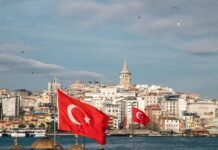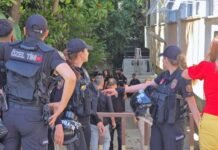
An annual report released by the US Department of State on religious freedoms around the world has revealed that various religious groups and minorities in Turkey continued to suffer rights violations and were not allowed to practice their faith or train clergy in the country, Turkish Minute reported.
The 2022 Report on International Religious Freedom, released on Monday, describes the status of religious freedom in every country as well as covering government policies violating religious beliefs and practices of groups, religious denominations and individuals, and US policies to promote religious freedom around the world.
In the section on Turkey the report detailed widespread rights violations of religious freedoms in Turkey last year as well as listing several positive developments.
A suspended prison sentence handed down to a flight attendant in İstanbul for his social media photograph that showed him drinking alcohol on the Islamic holy night of Eid al-Qadr (Kadir in Turkish) made its way into the report.
The flight attendant, Onur T., was given a suspended sentence of almost four months in October on charges of publicly insulting religious values.
The continued trial of nine Kurdish imams who were arrested in 2021 on terrorism-related charges for preaching in Kurdish and then released was also mentioned in the US report. The imams were arrested in İstanbul in July 2021 on terrorism charges for preaching and praying in Kurdish. They are accused of links to the outlawed Kurdistan Workers’ Party (PKK), which is listed as a terrorist organization by Turkey and much of the international community.
As for the rights violations faced by the non-Muslim religious minorities, the report said the Turkish government continued to limit their rights, especially those not recognized under the government’s interpretation of the 1923 Lausanne Treaty, which includes only Armenian Apostolic Orthodox Christians, Jews and Greek Orthodox Christians.
The government continued to treat Alevi Islam as a heterodox Muslim “sect,” categorized Alevi worship as cultural rather than religious and did not recognize Alevi houses of worship.
Turkey is a majority Sunni country, with some in the conservative and religious population viewing Alevis as apostates; therefore, people adhering to the Alevi faith generally avoid revealing their beliefs in public out of fear of facing discrimination or social alienation.
Alevis follow a heterodox Islamic tradition that separates them from Sunni and Shiite Muslims. Some view it as a cultural identity as much as a religious faith.
Turkey has long denied Alevi demands for state recognition, and Alevi houses of worship, known as cemevis, are not officially recognized by the state, hence given no financial assistance.
On May 25 a district municipality in Istanbul demolished the Meryem Ana Tomb despite protests by Alevis, who consider it sacred.
The report also mentioned continued entry bans and deportation of noncitizen leaders of Protestant congregations based on reports in the Turkish media and statements from nongovernmental organizations.
According to the “2021 Protestant Community Rights Violation Report,” released by the Association of Protestant Churches in Turkey in March 2021, dozens of Protestant pastors have had to leave Turkey along with their families over the past three years due to de facto entry bans and intelligence reports labelling them as “security risks,” striking yet another blow to Turkey’s tiny Christian community and religious diversity in the country.
The report showed 35 pastors in 2019, 30 in 2020 and 13 in 2021 were assigned special codes in Turkey that effectively prevented them from entering the country although they did not face a legal entry ban.
As examples of several positive developments promoting religious freedoms, completion of the restoration of two Armenian churches, where the Armenian patriarch presided over Mass, the reopening of a church by Orthodox Syriacs closed in 1915, the restoration of a Jewish cemetery by the Bodrum Municipality in western Turkey and the continued renovation of several synagogues and Jewish sites as an open-air museum by the İzmir Municipality in western Turkey were cited in the report.
The Turkish government also continued to restrict efforts of minority religious groups to train their clergy domestically, and the Greek Orthodox Halki Seminary remained closed.
A key minority problem in Turkey is the situation of the Halki Seminary, which belongs to the Greek Orthodox Church and was closed in 1971 after the Turkish Parliament enacted a law banning private institutions of higher learning.
The seminary still remains closed despite criticism and promises by the Turkish government to reopen it. The situation of the seminary has been cited in various reports on the issue, particularly in the annual country reports on Turkey prepared by the European Commission.
Acts of vandalism of places of worship and cemeteries belonging to religious minority groups also continued in Turkey in 2022, according to the report, which cited various examples such as the attack on six Alevi institutions and cemevis in Ankara, the damaging of 36 gravestones belonging to the Jewish community in Hasköy, İstanbul and the targeting of Christian elements of the Hagia Sophia, which the government reconverted to a mosque in 2020.
In the report, there was also a reference to the continued threats and pressure faced by the large diaspora community of ethnic Uyghur Muslims in Turkey from China as Uyghur community members continued to express concern regarding an extradition treaty the government signed with the People’s Republic of China in December 2020, which lawmakers had not debated or ratified as of year’s end. According to media reports, human rights defenders and government statements, the government showed a willingness to protect Uyghur Muslims in the country, did not deport any Uyghurs to the PRC during the year and consistently reiterated this policy.














